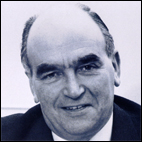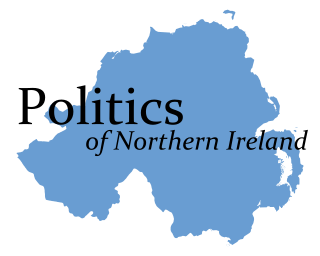Related Research Articles

The Ulster Unionist Party (UUP) is a unionist political party in Northern Ireland. The party was founded in 1905, emerging from the Irish Unionist Alliance in Ulster. Under Edward Carson, it led unionist opposition to the Irish Home Rule movement. Following the partition of Ireland, it was the governing party of Northern Ireland between 1921 and 1972. It was supported by most unionist voters throughout the conflict known as the Troubles, during which time it was often referred to as the Official Unionist Party (OUP).
The Sunningdale Agreement was an attempt to establish a power-sharing Northern Ireland Executive and a cross-border Council of Ireland. The agreement was signed at Sunningdale Park located in Sunningdale, Berkshire, on 9 December 1973. Unionist opposition, violence and general strike caused the collapse of the agreement in May 1974.

The Vanguard Unionist Progressive Party (VUPP), informally known as Ulster Vanguard, was a unionist political party which existed in Northern Ireland between 1972 and 1978. Led by William Craig, the party emerged from a split in the Ulster Unionist Party (UUP) and was closely affiliated with several loyalist paramilitary groups. The party was set up in opposition to power sharing with Irish nationalist parties. It opposed the Sunningdale Agreement and was involved in extra-parliamentary activity against the agreement. However, in 1975, during discussions on the constitutional status of Northern Ireland in the constitutional convention, William Craig suggested the possibility of voluntary power sharing with the nationalist Social Democratic and Labour Party. In consequence the party split, with dissenters forming the United Ulster Unionist Party. Thereafter Vanguard declined and following poor results in the 1977 local government elections, Craig merged the remainder of Vanguard into the UUP in February 1978.
The Unionist Party of Northern Ireland was a political party founded by Brian Faulkner in September 1974.

The United Ulster Unionist Party (UUUP) was a unionist political party which existed in Northern Ireland between 1975 and 1984.

William "Bill" Craig was a Northern Irish politician best known for forming the Unionist Vanguard movement.

Henry William West was a politician in Northern Ireland who served as leader of the Ulster Unionist Party from 1974 until 1979.

Albert Glenn Barr OBE was a politician from Derry, Northern Ireland, who was an advocate of Ulster nationalism. For a time during the 1970s he straddled both Unionism and Loyalism due to simultaneously holding important positions in the Vanguard Unionist Progressive Party and the Ulster Defence Association.
The Ulster Workers' Council was a loyalist workers' organisation set up in Northern Ireland in 1974 as a more formalised successor to the Loyalist Association of Workers (LAW). It was formed by shipyard union leader Harry Murray and initially failed to gain much attention. However, with the full support of the Ulster Defence Association (UDA) the UWC became the main mobilising force for loyalist opposition to power-sharing arrangements.

The Northern Ireland Constitutional Convention (NICC) was an elected body set up in 1975 by the United Kingdom Labour government of Harold Wilson as an attempt to deal with constitutional issues surrounding the status of Northern Ireland.

The Northern Ireland Assembly established in 1982 represented an ultimately unsuccessful attempt to restore the devolution to Northern Ireland which had been suspended 10 years previously. The Assembly was abolished in 1986.

The Belfast South by-election was held on 4 March 1982 following the death of Robert Bradford, Ulster Unionist Party (UUP) Member of Parliament for Belfast South.
Ernest Baird was a politician in Northern Ireland. Baird was born in County Donegal in the Irish Free State but moved with his family to Belfast at an early age.
A power-sharing Northern Ireland Executive was formed following the Northern Ireland Assembly elections of 1973. The executive served as the devolved government of Northern Ireland from 1 January 1974 until its collapse on 28 May 1974.
James Anderson Craig was a Unionist politician from Northern Ireland who was a founder member of, and early leading figure in, the Democratic Unionist Party.
Cecil Harvey was a unionist politician in Northern Ireland.
Charles Boucher "Charlie" Poots was a unionist politician in Northern Ireland.
George Morrison was a unionist politician from Northern Ireland.

The February 1974 United Kingdom general election in Northern Ireland was held on 28 February with 12 MPs elected in single-seat constituencies using first-past-the-post as part of the wider general election in the United Kingdom.

The October 1974 United Kingdom general election in Northern Ireland was held on 10 October with 12 MPs elected in single-seat constituencies using first-past-the-post as part of the wider general election in the United Kingdom.
References
- 1 2 3 4 5 "Abstracts on Organisations – 'U'". Archived from the original on 22 February 2011. Retrieved 9 November 2011.
- 1 2 3 4 5 W.D. Flackes & Sydney Elliott, Northern Ireland: A Political Directory 1968–1993, Blackstaff Press, 1994, p. 346
- ↑ Flackes & Elliott, p. 347
- ↑ "Glossary of the strike", The Irish Times , 2 May 1977, p.11